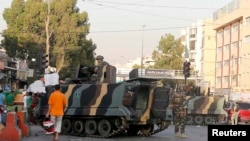The Islamic State of Iraq and the Levant (ISIL), the al-Qaida offshoot spearheading the militant Sunni insurgency in Iraq, has announced a new “emir,” or prince, in Lebanon, a country analysts say could be a major target of the jihadist group as it seeks to expand its power across the region.
He is Abdel Salam al-Ordoni, a Palestinian who lived for many years in refugee camps in Lebanon. Lebanese judicial officials say he has been highly active in Lebanon and is the man who gave the go-ahead for a recent attack on a restaurant in Beirut that left ten people wounded.
Last weekend, ISIL began calling itself the Islamic State, and in an online audio message revived the caliphate and named Abu Bakr al-Baghdadi as the “leader for Muslims everywhere”.
Analysts say the announcement was partly timed to undercut the group’s jihadist rival al-Qaida, which disavowed al-Baghdadi last winter for refusing to heed the instructions of the terror group’s overall leader, Ayman al-Zawahiri, Osama bin Laden’s successor.
“Put simply, Abu Bakr al-Baghdadi has declared war on al-Qaida,” says Charles Lister, a visiting scholar at the Brookings Institution’s Doha Center.
The announcement underlines al-Baghdadi’s wide aspirations in the region and his ambition to set up a jihadist state stretching from the Sunni-majority regions of Iraq, across eastern and northern Syria, to Lebanon.
According to Aaron Zelin, a Mideast scholar at the Washington Institute for Near East Policy, a DC-based think tank, the upstart jihadist group is serious about pursing a governing strategy and forming an Islamic state in which “all residents of territory it takes over fall under the group’s sovereign will and must abide by its interpretations of God’s law.”
In a research paper published this week, Zelin writes that in the al-Baghdadi model state, “no competition or power sharing can be acceptable.”
Lebanon has seen an uptick in attacks culminating in three suicide bombings near the end of June. The announcement of an IS leader in Lebanon only heightens the government’s concern.
“The security situation is dangerous in light of what is happening in Iraq,” Nabih Berri, Lebanon’s speaker of parliament, told reporters at a conference.
A series of suicide bombings in Lebanon last year tailed off this winter – a possible result of a successful offensive by the Shiaa militant group Hezbollah and Syrian government forces in the mountainous al-Qalamoun—a rugged region that borders Lebanon.
Lebanese security forces say many of the car bombs that hit the country last year were rigged in al-Qalamoun and driven into Lebanon. Those attacks left more than 130 dead and more than 1,000 people injured.
IS appears to have signaled its intention to revive the bombing campaign in a bid to sow sectarian mayhem in Lebanon and to strike at its rival Hezbollah, which has been fighting in the Syrian civil war on the side of President Bashar al-Assad.
“We tell the Party of Satan (Hezbollah) and its agent, the Lebanese army, that this is the first rain, and we tell you that there are hundreds of people seeking suicide, who love the blood of [Shia] rejectionists,” the jihadist group threatened in a statement.
Lebanese security forces have launched a crackdown on Sunni militants and say they have broken up half-a-dozen terror cells. Prime Minister Tammam Salam insists the authorities can contain terror groups.
“There is no safe haven for terrorism in Lebanon, and the internal situation is under control. It will not allow for such an environment to rise,” Salam is quoted as telling Al-Jazeera television.
But the IS challenge comes at a difficult time for Lebanon. The country’s religious sects are deadlocked over who to appoint as a new President—a stalemate that is not helping to calm any domestic sectarian dispute.
The increased jihadist activity has prompted new fears that Lebanon could be dragged back into another civil war. The first war, which ended in 1990, lasted 15 years and left 120,000 dead and one in four Lebanese wounded.
Lebanon has managed a fragile peace since then, in which all of its main religious sects share power. But any movement of IS into Lebanon could reignite sectarian tensions.
Jihadist groups have been present in Lebanon for at least two decades. The U.S. invasion of Iraq triggered rapid growth, especially among Palestinian refugees, hundreds of whom volunteered in the insurgency against America’s occupying forces.
Analysts fear that in naming Abdel Salam al-Ordoni as the new IS leader in Lebanon, Baghdadi aims to focus on refugee camps as fertile ground for new recruits.
Security sources who declined to be named for this article say jihadists are already actively recruiting in Palestinian refugee camps, especially in Ein el-Hilweh near Sidon, the largest of a dozen camps in Lebanon set up to house Palestinians who fled the 1948 Arab-Israeli war—and their descendants.




